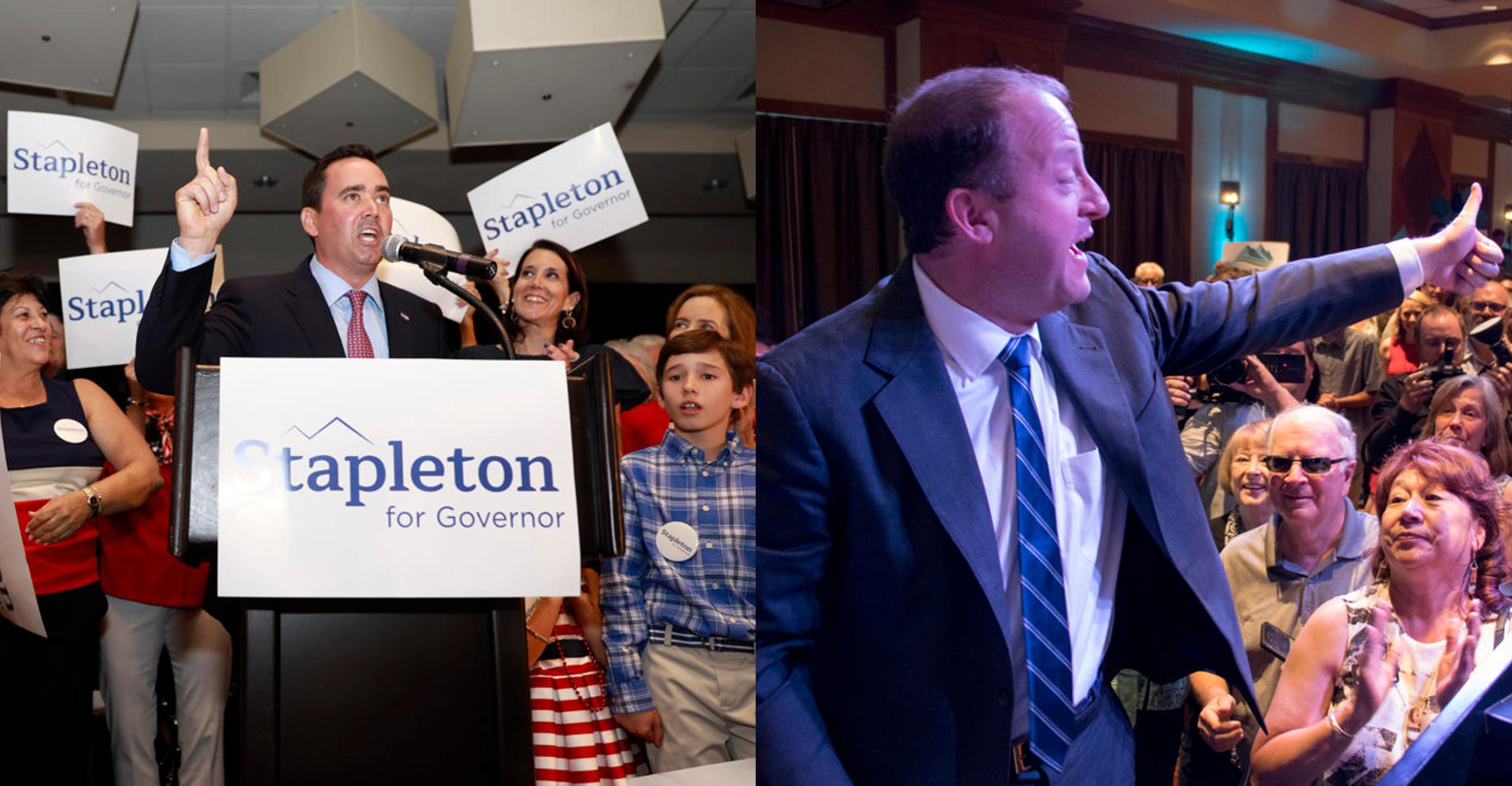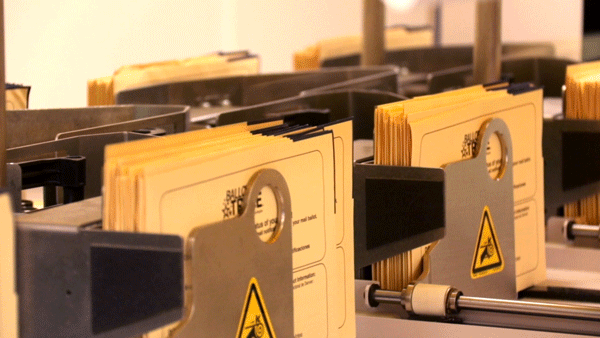
Those TV, radio, Facebook and Instagram ads from candidates vying for your vote this fall are going to get more incessant really soon. It's the start of a long road that will end months away in the general election — mark your Google calendar, it's Nov. 6.
Before that, we wanted to give you a head start and help you familiarize yourself with the candidates and initiatives you will see once you get your ballot in the mail or visit your polling place in November. We've created this guide as a reference for all the stuff you've kind of heard of and all the names you're kind of familiar with, so you can feel confident about your choice moving forward (and maybe pass it along to friends who also have questions).
Statewide ballot initiatives
Colorado allows residents to collect signatures to get a ballot measure before voters. In order to appear on the statewide ballot, backers need to collect 98,492 valid voter signatures (this is 5 percent of the total votes cast for all candidates for Secretary of State in 2014). Some initiatives seek to change the state's statutes, while others seek to change the Colorado Constitution. Due to Amendment 71 adopted in 2016, changing the constitution is tougher: An initiative seeking to make a change to the state constitution needs to get a 55-percent majority in the general election rather a simple majority. Signatures for ballot measures need to be verified by the Secretary of State's office by Sept. 5.
These are the 13 ballot questions you will be asked to consider this fall.
Amendment 73 Certified on ballot August 9. Originally called Initiative 93. A ballot measure that would change the state's constitution focusing on public funding for education. Voters will decide whether to raise taxes on corporations and wealthy people to raise $1.6 billion for schools. The ballot would also fund full-day kindergarten and increase funding for preschools with special needs. Tax raises are always controversial in Colorado, which requires any increases to go before voters because of TABOR.
To learn more: Colorado voters will decide on $1.6 billion tax increase for education. (Chalkbeat)
Amendment 74 Certified on ballot August 28. Originally called Initiative 108. A ballot measure to change the state constitution requiring compensation for a reduction in fair market value by government law or regulation. OK so this one is tricky, but basically, supporters say it would expand property owners' rights, giving them a better shot of being compensated from governments (like city, state or county) when laws or regulations reduce a property's fair market value. Shawn Martini at the Colorado Farm Bureau, which supports the initiative, said there are already laws in place requiring governments to compensate property owners if new regulations affect their property's value, but compensation is often only provided when the property is completely devalued. This law would essentially lower that threshold and provide more guidance to courts when making a ruling.
To learn more: Here are the initiatives that may be on the Colorado ballot this November. (AP)
Amendment 75 Certified on ballot Sept. 4. Originally called Initiative 173. A ballot measure to change the state constitution, and focusing on political campaign contribution amounts. This initiative would allow candidates in primary or general elections running for state office to accept five times the normal campaign contribution amount if their competing candidate spends more than $1 million of their money to support their campaign. KUNC reported both gubernatorial candidates support the initiative, which could help even the playing field for candidates without deep pockets.
To learn more: Seven ballot questions could face Colorado voters this November (Pueblo Chieftain)
Proposition 109 Certified on ballot August 22. Originally called Initiative 167. A ballot measure changing state statutes to authorize bonds for transportation projects. The aptly-named "Fix Our Damn Roads" proposal would seek money for transportation improvements by bonding, or borrowing, up to $3.5 billion. This initiative is a little more specific, adding that the borrowed money would be used only for road and bridge expansion, construction, maintenance and other reports for 66 highway projects outlines in the measure and existing throughout the state. This initiative places restrictions on how the money can be used, however, excluding transit, administration or indirect costs and expenses.
To learn more: Conservatives: Even if our transportation ballot initiative loses in November, we still win. (Westword)
Proposition 110 Certified on ballot August 23. Originally called Initiative 153. A ballot measure changing state statutes to increase sales taxes to pay for transportation improvements. Under this proposed initiative — which along with Initiative 167 targets statewide transportation infrastructure improvements — the state sale and use tax would increase .62 percent, from 2.9 percent to 3.52 percent over a 20-year period starting Jan. 1, 2019. According to its fiscal impact paperwork, this measure, called "Let's Go Colorado", would mean the average household would pay an estimated $130.63 more in sales and use tax.
To learn more: Backers of competing transportation initiatives turn in signatures to get onto ballot. (Fox31)
Proposition 111 Certified on ballot August 28. Originally called Initiative 126 A ballot measure to change the state statutes addressing payday loans. Addressing so-called "predatory payday loans," this initiative wants to cap payday loan annual interest rates at 36 percent. Organizers cited in their initiative draft that capping the charges could help some Colorado families avoid debt traps of repeating borrowing, with some lenders charging up to 200 percent interest annually.
To learn more: Signatures turned in on oil and gas, payday loan initiatives. (Colorado Politics)
Proposition 112 Certified on ballot August 29. Originally called Initiative 97. A ballot measure that would change the state's statutes focusing on setback requirement for oil and gas development. Voters will decide whether to increase the distance of new oil and gas drills to 2,500 feet away from occupied structures including public spaces, a sharp increase from the 500-foot minimum currently in effect. One study released in July suggested if passed, 85 percent of Colorado's non-federal land would be off-limits for oil and gas development. It could end up affecting the industry as a whole, which has led to it being among the most contentious initiatives this year.
To learn more: Colorado measure would make most of state off limits to drillers. (WSJ)
The following are referred ballot measures added by Colorado's General Assembly.
In order to qualify onto the state ballot, they had to attain two-thirds support from the state legislature, meaning representatives in both the House and Senate. They’re all officially on the ballot and all propose to change the state constitution.
Amendment V: A measure to reduce the minimum age for people to serve in the General Assembly. It would reduce the minimum age from 25 to 21 years old. Colorado currently joins Arizona and Utah as the states with the highest minimum age requirements in the country.
To learn more: New Era Colorado backs proposal to lower the minimum age for state lawmakers from 25 to 21. (Colorado Politics)
Amendment W: A measure to change how ballots ask voters if a judge should be retained; instead of asking a question for each judge, the new ballot would simply provide the judge’s name and a yes or no option for retaining under a question. Supporters believe it would clean up the ballot language by making it a little simpler and more reader-friendly.
Amendment X: A measure that takes out the industrial hemp definition from the constitution and adopts the federal definition. This is a measure backed by the state’s hemp industry, which is the largest in the country. By adopting the federal definitions, supporters say it allows some flexibility in case the feds enact laws allowing for more hemp cultivation and research. Hemp is currently defined as having a level of THC of about less than .3 percent concentration.
To learn more: A ballot initiative could determine fate of Colorado’s hemp industry. (Cannabis Wire)
Amendment Y: A measure to establish an independent panel to shape Congressional districts in Colorado. Maps are currently drawn by the state legislators, which has led to some court battles. This 12-member Independent Congressional Redistricting Commission would include an equal number of members from each of the two major parties and unaffiliated voters. It would also create a process for selecting the people on the commission and create requirements for transparency and ethics, as well as create a judicial review for commission maps.
This measure could be pivotal moving forward, as Colorado is projected to add a congressional seat (which means a new U.S. Representative) after the 2020 U.S. Census. The state currently has seven congressional districts. Maps are redrawn every 10 years.
To learn more: Two groups hoping to revamp Colorado’s redistricting process are joining forces. (Denverite)
Amendment Z: Similar to Amendment Y, but for state redistricting. This measure would replace the current Colorado Reapportionment Commission with the Independent Legislative Redistricting Commission. This commission would be in charge of drawing the state's legislative districts and include 12 members, including four each from the two major parties and four from unaffiliated members. The goal is to limit partisan politics in the redistricting process and provide more transparency.
Redrawing also happens every 10 years at the state level. The state currently has 35 state senators and 65 state representatives, but those numbers won't change because they're limited by the state constitution.
Amendment A: A measure to remove language from the state constitution that still makes it technically legal for slavery and involuntary servitude to be used as a punishment for a crime (yikes). It would remove a sentence from Article 11, Section 25 of the state's constitution that allows for this as a form of punishment and outlaws it under any circumstances. A similar and poorly-written version measure in 2016 led to some confusion that ultimately led it to be rejected by voters.
To learn more: Colorado ballot measure would remove 'slavery' from state constitution. (Fox News)
Statewide races
Governor
Current Gov. John Hickenlooper is term-limited, making way for a clash between fellow Democrat and current U.S. Rep. Jared Polis and Republican State Treasurer Walker Stapleton. Polis has served in Congress since 2009 and amassed a fortune after several entrepreneurial ventures, including online commerce. Stapleton has served as state treasurer since being elected in 2010 and also has a business background, having been involved in tech startups and working as a CEO and CFO of both public and private companies. Third-party gubernatorial candidates include Bill Hammons (Unity Party of Colorado), Scott Helker (Libertarian) and Paul Noel Fiorino (Unaffiliated).

Attorney General
Current Attorney General Cynthia Coffman opted not to run for re-election, instead launching a campaign for governor that didn't make it out of the Republican state assembly. George Brauchler, the Republican who is currently a District Attorney representing Arapahoe, Douglas, Elbert, and Lincoln counties, faces Democrat Phil Weiser, a former University of Colorado Law School dean who also served in the Justice Department in the Clinton and Obama administrations.

Secretary of State
Current Secretary of State Wayne Williams, a Republican and former El Paso County Clerk & Recorder, is running for re-election after being elected in 2014. Under Williams, the secretary of state's office has become a national model for effective election security. He faces a young Democratic challenger in Estes Park attorney Jena Griswold. Griswold previously served as a legislative fellow in U.S. Rep. Diana DeGette’s office and ran Hickenlooper’s Washington field office. She also worked for Organizing for America, an Obama-aligned organization, during the president’s reelection bid in 2012.

Treasurer
Republican Brian Watson and Democrat state Rep. Dave Young are vying to replace Stapleton for State Treasurer. Watson is a businessman who says on his campaign website he won't take a salary from the government if elected. Watson currently serves as CEO of Denver-based Northstar Commercial Partners, which he founded. Young has served in the legislature since July 2011 and is a former middle school teacher. Young has served in the Joint Budget Committee, which helps manage the state's budget and says on his website he's helped pass more than 120 bills with bipartisan support.
U.S. House of Representatives
District 1 — Denver area
Incumbent Rep. Diana DeGette, a Democrat, has held this seat since 1997. She'll face Republican Charles Casper Stockham, who also challenged her in 2016, earning 27.7 percent of the vote in the safe-blue district — to DeGette's 67.9 percent.
District 2 — Northern Colorado
Polis currently holds this seat, and in running for governor likely makes way for former CU Regent Democrat Joe Neguse, who will face Republican Peter Yu. Democratic candidates have won this district with at least 55 percent of the vote since 1998.
Neguse is a former CU regent who ran for Secretary of State in 2014. He lost that race to current Secretary of State Wayne Williams, with Williams taking 47.3 percent of the vote to Neguse's 45 percent. (American Constitution Party candidate Amanda Campbell earned 3.9 percent of the vote, and Libertarian David Schambach scored 3.7 percent.)
District 3 — Pueblo and western Colorado
Republican Rep. Scott R. Tipton is facing a challenge from Democrat Diane Mitsch Bush in the 3rd Congressional District. Tipton was first elected to the seat in 2010, after previously serving in Colorado's General Assembly. Mitsch Bush is a former Routt County Commissioner and three-time state representative who resigned her seat in the legislature representing Eagle and Routt Counties to focus on the congressional run.
District 4 — Eastern Colorado
Republican Rep. Ken Buck was first elected to serve in Congress in 2014. He is facing Karen McCormick, a Democrat, in a race to represent the Eastern Plains. Buck is a former Weld County District Attorney and former prosecutor with the U.S. Department of Justice. McCormick is a veterinarian from Longmont who hasn't held political office before.
District 5 — Colorado Springs area
Despite some petitioning controversy, incumbent Republican Rep. Doug Lamborn emerged from his primary mostly unscathed. Lamborn is a former state legislator who was first elected to Congress in 2006. Stephany Rose Spaulding is the Democratic challenger. The young candidate is a Baptist pastor and currently an associate professor of women's and ethnic studies at the University of Colorado, Colorado Springs.
District 6 — Aurora, Brighton, south suburbs
Rep. Mike Coffman, a Republican, has held this seat since 2009. This year, Democrat Jason Crow, a lawyer and former U.S. Army Ranger, continues in his party's tradition of trying to pick up this seat, which is typically viewed as vulnerable despite Coffman winning four of his five elections by 8 percentage points or more.
District 7 — Lakewood/Arvada/Westminster/Thornton
Democrat Ed Perlmutter has served in Congress since 2007 and is only the second congressman to serve in the 7th Congressional seat, which was created after the 2000 U.S. Census. Mark Barrington, the Republican challenger, will seek to become the district's third-ever congressman. Perlmutter is a former Colorado State Senator and lifelong Jefferson County resident. Barrington is is a two-time Lakewood City Council candidate who also ran unsuccessfully for state representative candidate in 2010.













